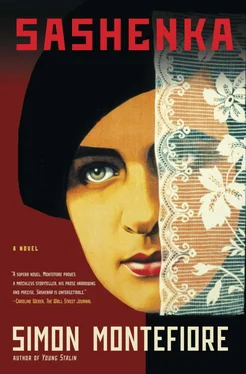Simon Montefiore
SASHENKA
There where the waves spray
The feet of solitary reefs…
A loving enchantress
Gave me her talisman.
She told me with tenderness:
You must not lose it,
Its power is infallible,
Love gave it to you.
Alexander Pushkin, “The Talisman”
Now and again in these parts, you come across people so remarkable that, no matter how much time has passed since you met them, it is impossible to recall them without your heart trembling.
Nikolai Leskov,
Lady Macbeth of Mtsensk
Here I am abandoned, an orphan, with no one to look after me,
And I will die before long and there’ll be no one to pray at my grave,
Only the nightingale will sing sometimes on the nearest tree…
Song of Petrograd street children, 1917
MOSCOW UNIVERSITY
SCHOOL OF HUMANITIES DEPARTMENT GAZETTE
12 MARCH 1994
PERSONAL ADVERTISEMENTS
SEARCHING!
WE SEEK YOUNG HISTORIAN, EXPERIENCED IN RESEARCH IN RUSSIAN STATE ARCHIVES.
THE PROJECT—A FAMILY HISTORY, THE TRACING OF LOST PERSONS, etc.
SIX MONTHS. ABSOLUTE DISCRETION REQUIRED.
SALARY: US$ PLUS EXPENSES. VALID PASSPORT/ID PAPERS TO TRAVEL. ONLY GRADUATES WITH TOP SCORES MAY APPLY.
APPLICANT TO START AT ONCE.
CONTACT: ACADEMICIAN BORIS BELIAKOV, DIRECTOR, DPT OF MODERN STUDIES AND LATER MODERN STUDIES, SCHOOL OF HUMANITIES.
PART ONE
St. Petersburg, 1916
The shy northern sun had already set by teatime when three of the Tsar’s gendarmes took up positions at the gates of the Smolny Institute for Noble Girls. The end of term at the finest girls’ boarding school in St. Petersburg was no place for policemen but there they were, unmistakable in their smart navy-blue tunics with white trimming, shiny sabers, and lambskin helmets with sultan-spikes. One clicked his fingers impatiently, another opened and closed the leather holster of his Mauser revolver and the third stood stolidly, legs wide, with his thumbs stuck into his belt. Behind them waited a traffic jam of horse-drawn sleighs, emblazoned gold and crimson with family crests, and a couple of gleaming limousines. The slow, slanting snowfall was visible only in the flickering halo of streetlights and the amber lamps of touring cars.
It was the third winter of the Great War and it seemed the darkest and the longest so far. Through the black gates, down the paved avenue, the white splendor of the pillared Institute rose out of the early twilight like an ocean liner adrift in the mist. Even this boarding school, of which the Empress herself was patron and which was filled with the daughters of aristocrats and war profiteers, could no longer feed its girls or heat its dormitories. Term was ending prematurely. The shortages had reached even the rich. Few could now afford the fuel to run a car, and horsepower was fashionable again.
The winter darkness in wartime St. Petersburg had a sticky arctic gloom all of its own. The feathery snow muffled the sounds of horses and engines but the burning cold made the smells sharper: gasoline, horse dung, the alcohol on the breath of the snoring postilions, the acrid cologne and cigarettes of chauffeurs in yellow-and red-trimmed uniforms, and the flowery perfumes on the throats of the waiting women.
Inside the burgundy leather compartment of a Delaunay-Belleville landaulet, a serious young woman with a heart-shaped face sat with an English novel on her lap, lit by a naphtha lamp. Audrey Lewis—Mrs. Lewis to her employers and Lala to her beloved charge—was cold. She pulled the bushy lambskin up over her lap; her hands were gloved, and she wore a wolf-fur hat and a thick coat. But still she shivered. She ignored the driver, Pantameilion, when he climbed into his seat, flicking his cigarette into the snow. Her brown eyes never left the door of the school.
“Hurry up, Sashenka!” Lala muttered to herself in English. She checked the brass clock set into the glass division that kept the chauffeur at bay. “Not long now!”
A maternal glow of anticipation spread across her chest: she imagined Sashenka’s long-limbed figure running toward her across the snow. Few mothers picked up their children from the Smolny Institute, and almost no fathers. But Lala, the governess, always collected Sashenka.
Just a few minutes, my child, she thought; my adorable, clever, solemn child.
The lanterns shining through the delicate tracery of ice on the dim car windows bore her away to her childhood home in Pegsdon, a village in Hertfordshire. She had not seen England for six years and she wondered if she would ever see her family again. But if she had stayed there, she would never have known her darling Sashenka. Six years ago, she had accepted a position in the household of Baron and Baroness Zeitlin and a new life in the Russian capital, St. Petersburg. Six years ago, a young girl in a sailor suit had greeted her coolly, examined her searchingly and then offered the Englishwoman her hand, as if presenting a bouquet. The new governess spoke scarcely a word of Russian but she knelt on one knee and enclosed that small hot hand in her own palms. The girl, at first hesitantly then with growing pressure, leaned against her, finally laying her head on Lala’s shoulder.
“Mne zavout Mrs. Lewis,” said the Englishwoman in bad Russian.
“Greetings to a bespoke guest, Lala! I am be-named Sashenka,” replied the child in appalling English. And that had been that: Mrs. Lewis was henceforth “be-named” Lala. The need met the moment. They loved each other on sight.
“It’s two minutes to five,” said the chauffeur tinnily through the speaking tube.
The governess sat forward, unhooked her own speaking tube and spoke into the brass cup in excellent Russian (though with an English intonation). “Thank you, Pantameilion.”
“What are the pharaohs doing here?” said the driver. Everyone used the slang term for the political police, the Gendarmerie. He chuckled. “Maybe the schoolgirls are hiding German codes in their petticoats?”
Lala was not going to discuss such matters with a chauffeur. “Pantameilion, I’ll need you to come in and get her trunk,” she said sternly. But why were the gendarmes there? she wondered.
The girls always came out on time. Madame Buxhoeven, the headmistress, known to the girls as Grand-maman, ran the Institute like a Prussian barracks—but in French. Lala knew that Grand-maman was a favorite of the Dowager Empress Maria Fyodorovna and the reigning Empress Alexandra.
A cavalry officer and a gaggle of schoolboys and students in gold-buttoned uniforms and caps walked through the gates to meet their sweethearts. In Russia, even schoolboys had uniforms. When they saw the three gendarmes, they started, then walked on, glancing back: what were the political police doing at a boarding school for noble girls?
Waiting to convey their masters’ daughters home, the coachmen, in ankle-length padded robes lined with thick white lamb’s fur, red sashes and bowler hats, stamped their feet and attended to their horses. They too observed the gendarmes.
Five o’clock. The double doors of the Smolny swung open, casting a ribbon of canary light down the steps toward the gates.
Читать дальше













